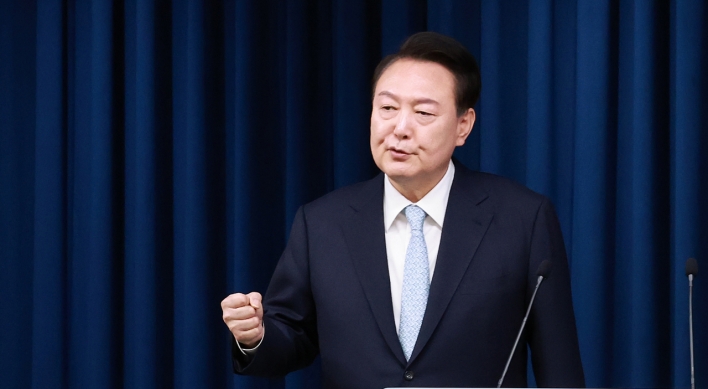Park Su-nam can neither read music nor play an instrument, but the 19-year-old North Korean defector is a proud member of the Heemang Poongcha Orchestra, along with 75 others who crossed the border to escape poverty and oppression.
The orchestra, whose name means Windmill of Hope, was launched earlier this month by the Korean Red Cross to help the teens overcome their scars and adapt to life in the South.
“The orchestra will aspire to support young North Korean defectors by helping them get used to South Korean society and offering a psychical cure through music, as well as discovering artistic talents,” Yu Jung-geun, the president of the Korean Red Cross, said.
The young musicians are led by Geum Nan-se, Korea’s top conductor and CEO of the Euro-Asian Philharmonic Orchestra, and receive lessons from professional performers and college students.
The orchestra, whose name means Windmill of Hope, was launched earlier this month by the Korean Red Cross to help the teens overcome their scars and adapt to life in the South.
“The orchestra will aspire to support young North Korean defectors by helping them get used to South Korean society and offering a psychical cure through music, as well as discovering artistic talents,” Yu Jung-geun, the president of the Korean Red Cross, said.
The young musicians are led by Geum Nan-se, Korea’s top conductor and CEO of the Euro-Asian Philharmonic Orchestra, and receive lessons from professional performers and college students.

“Because music touches the hearts of children, it will comfort the wounds and difficulties they have, and will give them hope for the future,” Geum said.
It holds true to Park, who plays the cello. Being a member of the orchestra is a crucial source of his pride in a society where North Koreans are still strangers and lag behind in competition.
“I thought if I have something to be proud of, I would be a lot more confident once I move on to the real world. After all, confidence is what most North Korean defectors lack the most.”
He attends Hangyeore Middle and High School, an institution for North Korean children.
“I was told that the cello would suit me more because my stature is bigger than the others, but what I originally wanted to play was actually violin,” said Park.
He came to South Korea in 2006 with his family and entered Incheon Jangdo Elementary School.
Back then, he was the only North Korean defector in the school, and did not have to tell the others where he was from. But as more defectors started coming to the school, it became increasingly difficult for him to mix in with fellow South Korean students.
“I witnessed the discrimination against us. Although I was not a frequent target for bullying, simply because not many knew that I was one of the defectors, the atmosphere made me feel uncomfortable.”
In addition, competition is especially hard to take for those who come from the communist society where people do not compete for marks or jobs but just accept what is given to them.
The orchestra is unable to handle all the issues young defectors face. However, music and engagement help them think positively and overcome their difficulties, such as with Lee Myung, another student at Hangyeore.
“Yes, it was hard living in North Korea, and I think the 10 years I lived there, I have become a lot tougher both mentally and physically. If there is something I learned from the North, it would be the ability to overcome and endure hardships. I expect my ability to overcome hardships will aid me in learning a new instrument and being successful at it,” said Lee who plays the viola.
When the Red Cross was recruiting members from Hangyeore, other schools that accommodate many defector students, the project was met with both enthusiasm and concern.
“I have never received systematic schooling for music, and I cannot even read music. I was afraid of having to learn everything from scratch,” Lee remarked.
“The recorder is the only instrument I ever played. Every student plays it in primary and middle school,” said Lee.
“In North Korea, learning a musical instrument in itself is already a privilege. And like most other families, we could not afford it.”
Most members of the orchestra do not know how to play their instruments yet, so it will take some time before they can start performing.
Students will receive lessons on playing their instruments weekly and be guided by the members of professional orchestras like the Euro-Asian Philharmonic Orchestra and Incheon Philharmonic Orchestra, and students from the Korea United College Orchestra.
The orchestra project is part of the Windmill of Hope campaign by the Red Cross, which assists North Korean refugees, poor children, elderly people and multicultural families.
Incheon City supports the music program and SeAh Steel provided 1 million won to purchase instruments.
By Kim Jung-ho (jungho1991@gmail.com)








![[KH Explains] Can tech firms' AI alliances take on Nvidia?](http://res.heraldm.com/phpwas/restmb_idxmake.php?idx=644&simg=/content/image/2024/05/07/20240507050619_0.jpg&u=)








![[K-pop’s dilemma] Time, profit pressures work against originality](http://res.heraldm.com/phpwas/restmb_idxmake.php?idx=652&simg=/content/image/2024/05/08/20240508050705_0.jpg&u=20240508171126)
![[Today’s K-pop] NCT Dream to drop pre-release from 2nd Japan single](http://res.heraldm.com/phpwas/restmb_idxmake.php?idx=642&simg=/content/image/2024/05/08/20240508050725_0.jpg&u=)